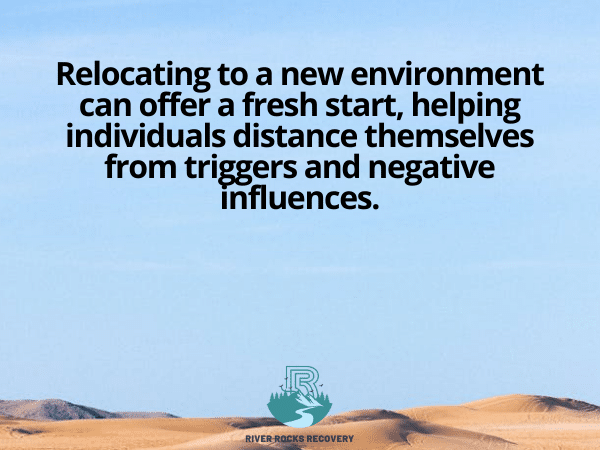For many people struggling with addiction, the idea of moving to a new place for a fresh start can be very appealing. The hope is that by leaving behind toxic relationships, old habits, and triggers, it will be easier to break free from substance abuse. However, relocating alone does not guarantee recovery. Addiction is a complex disease that requires more than just a change in scenery—it demands professional treatment, behavioral change, and emotional healing.
At River Rocks Recovery, we recognize the important role environment plays in recovery, but we also understand that true, lasting sobriety comes from structured addiction treatment programs, peer support, and lifestyle changes.
If you are considering moving to escape addiction, it is important to weigh the pros and cons carefully. This article explores:
- Does moving help with addiction recovery?
- The benefits and drawbacks of relocating
- Situations where moving might be necessary
- Why addiction treatment is more effective than moving alone
- Alternatives to relocating for addiction recovery
Can Moving to a New Place Help Overcome Addiction?
Changing your environment can reduce certain triggers and give you a fresh perspective on life. However, addiction is not solely about external factors—it is a disease that affects brain chemistry, behavior, and mental health.
If someone moves without addressing the root causes of addiction, they may find themselves falling into old patterns even in a new place. Triggers are not just physical locations; they also exist in thoughts, emotions, and stressors.
For some people, moving can be a useful part of their recovery journey, but only if combined with structured addiction treatment to address the underlying causes of substance use.
Pros and Cons of Moving for Addiction Recovery
Pros of Moving for Sobriety
Distance from Triggers and Negative Influences
- If a person’s environment encourages substance use, moving away can help reduce temptation and access to drugs or alcohol.
- Leaving behind friends who enable substance abuse can remove peer pressure and create an opportunity for healthier relationships.
A Fresh Start and a New Perspective
- A new environment can provide a mental and emotional reset, allowing a person to redefine their habits and lifestyle.
- The absence of old routines, places, and people associated with substance use can make it easier to focus on recovery.
Greater Access to Quality Addiction Treatment
- Some people live in areas with limited treatment resources. Moving to a place with more addiction treatment options, such as Partial Hospitalization Programs (PHP) and Intensive Outpatient Programs (IOP), can improve long-term recovery outcomes.
Increased Privacy and Reduced Stigma
- If an individual feels judged or stigmatized in their current community, moving to a new place can remove shame and allow healing without outside pressure.
Cons of Moving for Sobriety
Relapse Can Happen Anywhere
- If addiction is not treated at its core, a person may find new ways to access substances in their new location.
- Without professional treatment, the emotional and psychological issues that drive addiction remain unresolved.
Loss of Support System
- Leaving behind family, friends, and local support groups can make it harder to stay accountable in recovery.
- Many people thrive in recovery when they have sober peers and community connections.
Financial and Logistical Challenges
- Moving can be expensive and stressful, leading to financial strain and uncertainty.
- Finding stable employment and housing in a new place can be overwhelming, and stress can become a trigger for relapse.
Escaping Problems Instead of Solving Them
- Moving may create the illusion of a fresh start, but it does not fix the internal struggles and unresolved trauma that contribute to addiction.
- If someone moves without professional addiction treatment, they may continue to repeat old patterns in a new setting.
When Moving May Be Necessary for Addiction Recovery
Although moving is not always the best solution, there are cases where relocation is necessary for safety and recovery. These include:
Living in a toxic or abusive environment – If a person is surrounded by domestic violence, emotional abuse, or enabling behaviors, relocating may be the only way to break free.
High relapse risk due to easy access to substances – If drugs or alcohol are constantly available, staying in the same environment can make recovery extremely difficult.
Lack of addiction treatment options nearby – If a person lives in an area with no rehab centers, outpatient programs, or sober living homes, moving may provide access to better treatment resources.
Legal or safety concerns – If someone has legal trouble or criminal influences due to substance use, moving can offer an opportunity for a new beginning.

Why Addiction Treatment Is More Effective Than Moving Alone
Relocation alone does not treat the root causes of addiction. Addiction is a disease that affects the brain, behavior, and emotions, and professional treatment is essential for long-term recovery.
1. Medical Detox and Safe Withdrawal Management
- For individuals dependent on alcohol or drugs, medical detox is often necessary before beginning recovery.
- A medically supervised detox program provides support to manage withdrawal symptoms safely.
2. Therapy and Counseling to Address the Root Causes of Addiction
- Cognitive-Behavioral Therapy (CBT) and Dialectical Behavior Therapy (DBT) help individuals:
- Recognize triggers and cravings
- Develop healthy coping strategies
- Process trauma and emotional pain
3. Partial Hospitalization and Intensive Outpatient Programs
- PHP and IOP programs provide structured recovery while allowing individuals to stay in their community.
- These programs teach relapse prevention strategies and essential life skills for long-term sobriety.
4. Sober Living and Outpatient Support
- If relocation is necessary, sober living homes offer a structured and supportive environment without requiring a complete move.
- Outpatient addiction treatment allows individuals to continue therapy and recovery coaching while adjusting to daily life.
Best Alternatives to Moving for Addiction Recovery
Instead of relocating, individuals can take other proactive steps to build a healthier, sober lifestyle:
- Enroll in a structured addiction treatment program (PHP, IOP, or OP).
- Consider sober living communities that provide support while maintaining structure.
- Join local or virtual support groups such as Alcoholics Anonymous (AA) or SMART Recovery.
- Create new social circles by surrounding yourself with sober, supportive individuals.
- Develop new hobbies and healthy routines to replace substance use triggers.
Conclusion
Moving to a new location can provide a fresh start, but it is not a solution for addiction. True recovery comes from structured addiction treatment, emotional healing, and strong support systems. Relocating can help in some situations, but it should always be paired with professional addiction treatment to ensure lasting sobriety.
At River Rocks Recovery, we provide comprehensive addiction treatment programs that allow individuals to achieve long-term sobriety without needing to relocate. Our Partial Hospitalization Program, Intensive Outpatient Program, and Outpatient Programs provide the tools needed for recovery. Call River Rocks Recovery at 888.905.6281 today for a confidential consultation.
FAQ About Moving for Addiction Recovery
Will moving to a new place help me stop using drugs or alcohol?
Moving can help if your current environment contributes to substance use, but it is not a cure for addiction. Without proper addiction treatment, the underlying emotional and behavioral patterns that drive substance use may persist, even in a new location.
What are the benefits of moving for addiction recovery?
Some benefits of relocating for recovery include:
- Removing yourself from triggers and negative influences.
- Accessing better addiction treatment programs.
- Starting fresh and rebuilding a healthier lifestyle.
However, moving should be combined with structured addiction treatment to ensure long-term success.
What are the risks of relocating to overcome addiction?
Potential drawbacks of moving include:
- Losing support from family, friends, and sober peers.
- Facing financial and logistical challenges.
- Escaping problems rather than addressing them through therapy and treatment.
- Possibly falling into old habits in a new location without professional guidance.
When is moving necessary for recovery?
Relocation may be necessary if:
- You live in a toxic or abusive environment where substance use is encouraged.
- There is limited access to addiction treatment programs in your area.
- You are experiencing legal issues or safety concerns due to drug or alcohol use.
What are the best alternatives to moving for addiction recovery?
Instead of relocating, consider:
- Enrolling in an Addiction Treatment Program such as Partial Hospitalization (PHP) or Intensive Outpatient (IOP).
- Joining a sober living home for a supportive, structured environment.
- Attending therapy and support groups to build strong relapse prevention skills.
- Developing new social circles and hobbies to promote a substance-free lifestyle.




























